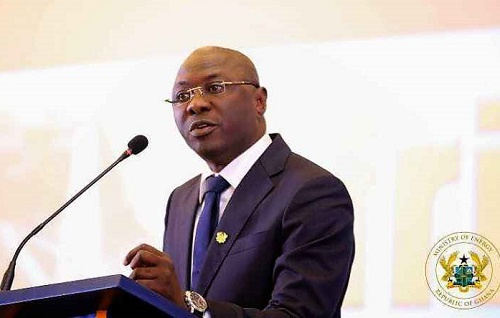Deputy Energy Minister, Dr. Mohammed Amin Adam, says he is surprised by the National Democratic Congress’ (NDC) manifesto promise to increase power generation capacity in the country.
According to him, the country is currently dealing with the problem of excess power capacity generated by the NDC in their last administration and had expected the party to suggest methods to resolve the problem in their manifesto rather than exacerbating the issue by adding on to the country's power generation.
“The NDC, our friends are making a new promise on expanding capacity. One of the major challenges in the energy sector now is the issue of excess capacity, and so I was expecting that they will tell Ghanaians how they intend addressing the excess capacity; a problem which was created by them actually.”
Speaking on JoyNews’ PM Express, the Minister revealed that in an effort to curb the 'dumsor' phenomenon, the ertswhile NDC administration signed a number of Power Purchase Agreements (PPA) that required independent power producers to generate power for the country.
"They signed several power purchase agreements, at the last count 42 power purchase agreements that require different power companies to put up power plants to generate power".
These, according to him were "done without recourse to competitive bidding processes" and these PPAs have been executed even though Ghana does not need that much power.
This has led to the production of approximately 5,000 megawatts (MW) of electricity, when the country consumes only 2,400 MW at its peak, leaving an excess margin of over 1500 MW.
“And so you have almost 2,000 MW of generation capacity that is not needed. Even if you take away what we call reserve margin, the reserve margin by international standards should be between 20 - 25% of your total installed capacity. You are still going to be saddled with almost 1000 to 1,500 MW of power that are not needed,” he said.
Moreover, this excess power generated now costs the country approximately half a billion United States dollars annually for the over excess power it does not need.
"It is not just power that is not needed, but power that we have to pay for, even though we have no need for that power. Today what we have is excess capacity charges that Ghana has to pay".
This predicament of paying excess capacity charges, he explained, is as a result of the nature of the 'take or pay' PPA contracts that the NDC signed in an attempt to resolve the power crisis.
“And 'take or pay' means that once they declare availability you have to pay for it whether you use it or not. And so half a billion annually is no small money and therefore the NDC should have been helping us address the financial burden they have put on Ghana as a result of the excess capacity and yet they’re coming to promise Ghanaians again that they will expand generation capacity.”
The Minister further added that this cost had added to the country's debt profile. Unfortunately government cannot charge the excess capacity on tariffs, otherwise, it will lead to a 300% increment in charges, thus the government of Ghana has to find alternative ways to solve the issue.
“We have been paying for some of them but certainly half a billion annually is so much for the economy to accommodate and therefore they will go to add up to our debt profile.”
Latest Stories
-
Goldbod rakes in $1.17bn after first full month – Finance Minister
2 minutes -
Walewale MP to establish state-of-the-art recording studio to boost creative art and fight drug abuse menace
8 minutes -
Ato Forson signs ¥402m grant agreement with Japan to boost human capital development
11 minutes -
Bunkprugu Paramount Chief officially gazetted after 18-year legal battle
15 minutes -
Establish centralise digital platform for taxpayers to file annual financial statements – Deloitte Associate Director to government
16 minutes -
Ongoing drainage projects must be backed by attitudinal changes towards waste – Adjei-Mensah Korsah
22 minutes -
Mpox outbreak: 26 new cases confirmed, total cases now 45
30 minutes -
OSP is a waste of public funds – Kwabena Agyepong slams handling of Ofori-Atta
36 minutes -
Music producer Joseph Appiah to present constitution audio book to Mahama
43 minutes -
OSP dismisses purported medical report on Ken Ofori-Atta, denies receiving any official document
1 hour -
Kwabena Agyapong challenges OSP’s authority to declare suspects wanted
1 hour -
10-years after June 3 Disaster: Nii Ashitei Ashietey calls for bold action to end perennial flooding
2 hours -
Ten Years On: June 3 disaster survivors share painful memories and call for civic responsibility
2 hours -
Ibrahim Tanko reflects on tough loss to Kotoko, eyes bounce back against Berekum Chelsea
2 hours -
2028 Presidential Elections: The Lion and the Mosquito set for epic presidential showdown
2 hours

